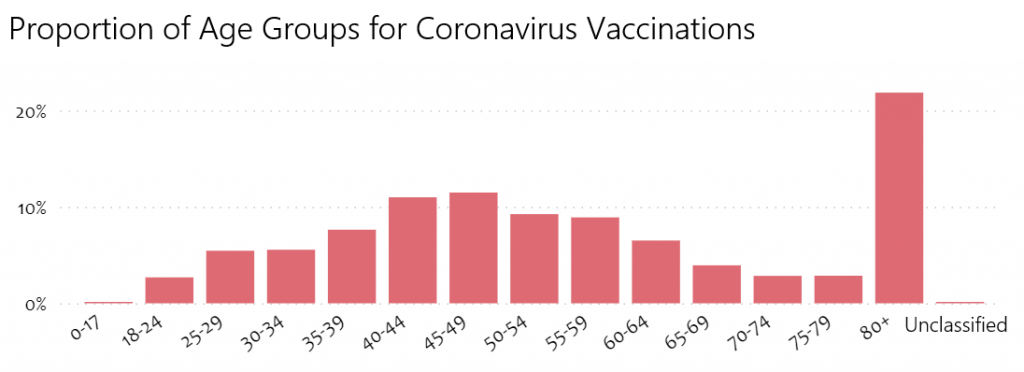Nearly 50,000 doses of the coronavirus vaccine have been administered in South Moravia. More than 150 firefighters, police officers and soldiers are assisting the region in fighting the spread of covid-19. The regional authorities anticipate several high-capacity vaccination centres to operate from March. Scientists from Brno University of Technology have helped create simulations for the operation of the centres. Photo credit: Courtesy of South Moravian Region.
Czech Rep., Feb 10 (BD) – The South Moravian Regional Hygiene Office has provided an overview of the COVID-19 situation in the South Moravian Region as of February 9th, 2021. Since March 11th last year, over 99,000 people have tested positive for coronavirus and 1,859 people have died, with an average age of 80 years. The most problematic cases requiring hospitalization are in the age group between 65 to 74 years and especially patients above 75 years old – hospital care is needed in a third of these cases.
In South Moravia, there are currently 8,911 active cases of Covid-19, and 528 people are hospitalised, of whom 93 are serious cases. Laboratories have reported 755 samples of the British mutation, 2.6% of positive cases in the region since the start of 2021. The hygiene office did not recognize any risk context or increased severity of cases in relation to the British mutation. Cases of this version of coronavirus were not concentrated in any specific areas but in various parts of the region, occurring mostly in families.
Up-to-date information on coronavirus vaccination statistics in the South Moravian Region can be found here (in Czech). The total number of doses administered in the region as of February 9th is 48,928, with 21.84% of those receiving vaccinations aged 80 years and above.

Over 150 firefighters, police officers and soldiers are involved in managing the coronavirus situation in the South Moravian Region. Currently, 72 firefighters from the South Moravian Fire Brigade (HZS JMK) are deployed daily to assist in hospitals, testing stations or mobile vaccination teams. Around 40 police officers and soldiers from the Czech Police and the Czech Army are also assisting. More help will be needed with the launch of large-capacity vaccination centres across the region.
According to representatives of the region, 600 to 1,000 people will receive vaccinations in the centres each day. The high-capacity vaccination centres in Znojmo, Blansko, Kyjov, Břeclav, Vyškov, Hodonín and Hustopeče are expected to operate from the beginning of March. By this time the supply of vaccines should be sufficient for mass vaccination. The facility in Znojmo is currently operating in trial mode, providing vaccinations to health care professionals.
Scientists from Brno University of Technology (BUT) collaborated with experts from the region to develop models to help the vaccination centres operate optimally. After observing the vaccination process of seniors at the Brno Exhibition Centre, the scientists created three-dimensional virtual reality simulations to test how the centre would function at full capacity.
“We know how many people such a center can serve, we can design the placement of registration tables or the dimensions of vaccination stations with waiting rooms. The traffic in the center is then as smooth as possible, helped by unified descriptions for better navigation. In the case of Znojmo, about 700 people could pass through the vaccination center in 12 hours,” explained Tomáš Apeltauer from the BUT Faculty of Civil Engineering.
Student medics who were called on to perform obligatory work duties in hospitals and social facilities are facing ongoing complications regarding remuneration. A month ago, the Ministry of Finance agreed to waive the obligation for students to pay taxes for these work duties. However, according to South Moravian Governor Jan Grolich (KDU-ČSL), the state has not yet provided remuneration to students who assisted the region in Autumn. As a result, the South Moravian Region will provide around CZK 11.5 million from its budget.
Studenti, kteří nám pomáhali v rámci pracovní povinnosti na podzim, pořád nedostali odměnu. Začíná to být trochu trapné. Státu to pořád trvá, takže dohromady zhruba 11,5 milionu posíláme z našeho rozpočtu.
— Jan Grolich (@JanGrolich) February 10, 2021
On Monday, February 8th, Grolich received the Russian Consul General, Alexander Alexandrovich Kalachev, in Brno. During the meeting, they discussed possible cooperation between South Moravia and Russian regions, as well as both sides’ experience of the fight against coronavirus.







